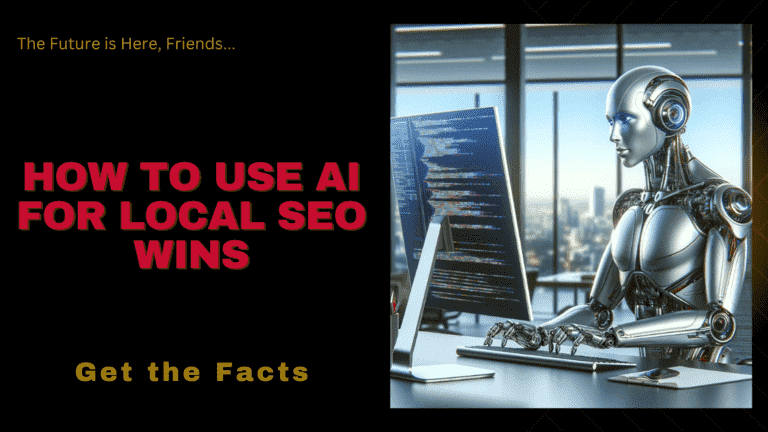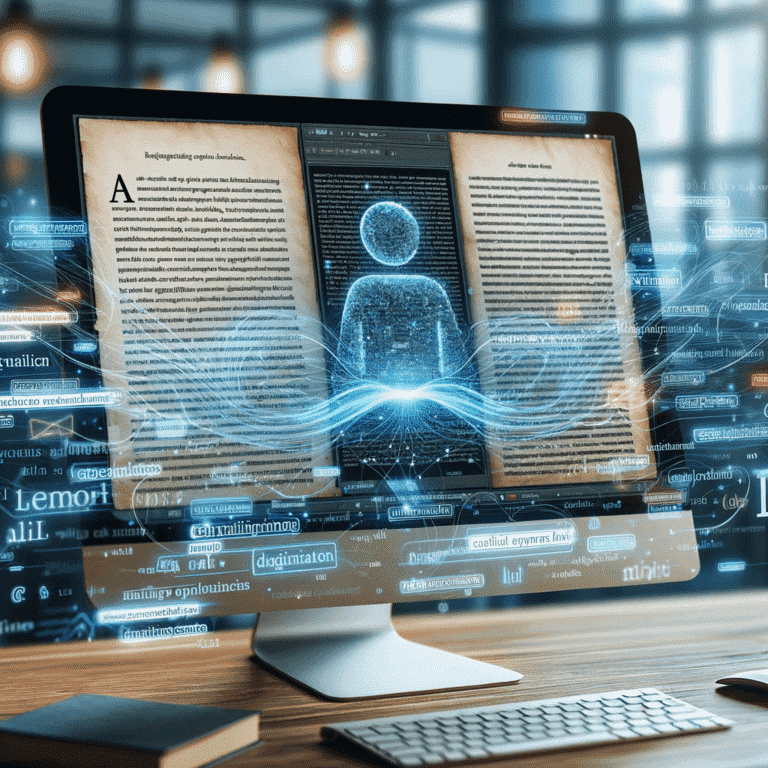In today’s digital landscape, achieving a prominent online presence is crucial for businesses. For many, this begins at the local level, where potential customers are searching for products and services nearby. If you’re a small business owner in a bustling city and have been handling your SEO campaigns, you may have realized that it’s not a walk in the park. The good news is that you can harness the power of Artificial Intelligence (AI) to supercharge your local SEO efforts. In this guide, we’ll delve into the world of AI-driven SEO and show you how to use it to your advantage.

Let’s clear the fog around AI and its role in local SEO. In this context, AI refers to advanced algorithms and machine learning models that can analyze vast amounts of data, identify patterns, and make informed decisions to optimize your website’s search engine ranking. Here’s why AI is a game-changer:
Now that we’ve got a grip on what AI in local SEO entails let’s dive deeper into the areas where AI can significantly impact.

Before you can improve your local SEO, it’s essential to understand what factors influence your ranking in the first place. Here’s a rundown of the critical elements:
You might be wondering how AI can help with these ranking factors. AI can assist in analyzing data related to these factors and suggest improvements, ensuring you’re always in Google’s good graces.
In the upcoming sections, we’ll explore how to leverage AI tools and software for your local SEO strategy, delve into content optimization with AI, and much more. So, stay with us on this journey as we uncover the secrets of using AI to propel your business to the top of local search results!

Now that you better understand how AI can impact local SEO, it’s time to explore the practical side of things – leveraging AI tools and software to supercharge your efforts.
AI-powered SEO tools are your secret weapon for better local SEO rankings. These tools are designed to assist you at every step of your SEO journey. Here’s what they can do:
Let’s take a closer look at some of the most popular AI-driven SEO tools you can use to boost your local SEO game:
SurferSEO
SurferSEO analyzes top-ranking pages for your target keywords and provides optimization recommendations, helping you understand what it takes to rank higher.
Clearscope
Clearscope helps you identify relevant keywords to include in your content, ensuring it’s comprehensive and stands out in search results.
SEMrush
SEMrush is an all-in-one SEO suite with AI-powered features for keyword research, site audit, and competitor analysis.
Moz Pro
Moz Pro offers AI-driven tools for keyword research, backlink analysis, and site audits, making it a versatile choice for improving local SEO.
These tools can be your trusted companions on your local SEO journey, simplifying complex tasks and providing data-driven insights.

One of the areas where AI shines brightly in local SEO is content optimization. High-quality, relevant content is the cornerstone of a successful SEO strategy. Here’s how AI can lend a helping hand:
AI-driven content optimization saves you time and ensures your content is highly relevant and engaging, meeting the expectations of your audience and search engines.

On-page SEO plays a vital role in local SEO success, and AI can significantly enhance your efforts in this area.
By combining AI with your on-page SEO efforts, you’ll create a website that attracts search engine crawlers and provides a seamless experience for your visitors.
In the upcoming sections, we’ll delve into AI-powered local keyword research, monitoring and reporting with AI, enhancing user experience, and real-life case studies. Get ready to take your local SEO game to the next level!

Regarding local SEO, selecting the right keywords is like picking the perfect location for your physical store – it can make or break your business. AI can be your trusty guide in this crucial aspect of SEO.
By harnessing AI for local keyword research, you can fine-tune your SEO strategy and ensure you’re targeting the right keywords that resonate with your local audience.

You need a reliable compass to steer your local SEO ship in the right direction, and AI can be just that. Let’s explore how AI can assist you in monitoring and reporting your SEO efforts.
By using AI for monitoring and reporting, you’ll be well-equipped to make informed decisions and demonstrate the tangible results of your local SEO efforts to your clients.

In the digital realm, the user experience is your virtual storefront’s ambiance. AI can help you create an inviting atmosphere that keeps visitors coming back.
By focusing on user experience enhancements powered by AI, you’ll improve your local SEO rankings and create a website visitors love to explore.
The following sections will explore real-life case studies showcasing businesses harnessing AI for local SEO success. We’ll also take a sneak peek into the future of AI in local SEO, so stay tuned for more insights!

As technology advances, it’s essential to stay ahead of the curve regarding AI in local SEO. Let’s glimpse the future trends and developments in this ever-evolving field.
By keeping an eye on these emerging trends and incorporating AI innovations into your local SEO strategy, you’ll be well-prepared to maintain a competitive edge in the digital landscape.

Congratulations! You’ve now embarked on a journey through AI-powered local SEO, discovering how artificial intelligence can be a game-changer for your business’s online presence. Let’s recap the key takeaways from this comprehensive guide.
In a world where online visibility can make or break a business, leveraging AI in your local SEO efforts is a strategic move. It’s not just about staying competitive; it’s about thriving and growing your online presence.
As you implement AI-driven strategies and tools, remember that SEO is an ongoing journey. Stay adaptable, keep experimenting, and be open to new AI innovations that can further elevate your local SEO game.
Your small business in the heart of a bustling city can achieve remarkable results with the right approach. With AI as your ally, you can conquer the local SEO landscape and lead your business towards digital success.
Thank you for joining us on this enlightening journey through AI-powered local SEO. We wish you the best of luck in your SEO endeavors, and may your digital wins continue to grow!

AI in local SEO refers to using Artificial Intelligence tools and algorithms to analyze data, identify patterns, and optimize your website’s search engine ranking. It helps businesses improve their online visibility and attract local customers.
Key factors include Google My Business listings, on-page SEO, backlinks, user experience, and location-specific keywords.
AI tools can help businesses with keyword research, content optimization, competitor analysis, and monitoring and reporting. They streamline the SEO process and provide data-driven insights.
AI can generate and optimize content, making it more relevant and engaging for users and search engines. It can suggest improvements in keyword usage and content structure.
On-page SEO involves optimizing elements like meta tags, structured data, and content. AI can assist by suggesting improvements and ensuring your website is well-structured and user-friendly.
AI-driven tools can identify location-specific keywords, analyze competitor strategies, and understand user search intent, helping businesses target the right keywords effectively.
AI simplifies data analysis, provides real-time tracking, and allows for the creation of customized reports. It helps businesses measure and demonstrate the success of their local SEO efforts.
AI can improve user experience by optimizing website performance (e.g., faster loading times), ensuring mobile-friendliness, personalizing content, and optimizing for voice search.
Yes, businesses like local restaurants, law firms, and e-commerce stores have experienced significant improvements in website traffic, conversions, and revenue by leveraging AI in their local SEO strategies.
Emerging trends include:
To get started, explore AI-powered SEO tools and consider partnering with an AI-influenced SEO agency like Digital Wins to benefit from their expertise and resources.
 Glossary
GlossaryHere are seven offsite resources that mat help you:
Moz:
Description: Moz is a renowned source for SEO insights, tools, and resources. Their blog and learning center offers valuable articles, guides, and research to help you stay updated on SEO trends and best practices.
Description: Search Engine Land is a trusted publication covering all search engine marketing (SEM) and SEO aspects. Their articles, analyses, and columns provide in-depth insights into the world of SEO and local SEO.
Description: SEMrush is a comprehensive SEO and digital marketing platform. Their blog offers a wealth of SEO-related content, including articles, case studies, and tutorials to improve your SEO knowledge.
Description: HubSpot’s blog covers various marketing topics, including SEO. They provide actionable insights, templates, and guides to help you enhance your SEO and inbound marketing strategies.
Description: Neil Patel is a well-known digital marketing expert. His website features a blog with SEO-related content, video tutorials, and tools to help you optimize your online presence.
Description: Ahrefs is a popular SEO tool provider. Their blog offers SEO guides, case studies, and research-backed insights to assist you in improving your SEO skills and strategies.
Description: Yoast is a leading SEO plugin for WordPress users. Their blog covers various SEO topics, offering practical tips and advice for optimizing your website’s SEO performance.
These offsite resources provide additional information and guidance on SEO, local SEO, and digital marketing strategies to complement the content provided here.

As you explore the SEO tips on this page, it’s essential to know that our co-founder, Matt LaClear, has provided these valuable insights.
With over a decade of experience, Matt has worked on more than 13,277 client SEO campaigns since 2009, making him a trusted authority in the field.
To take your SEO efforts to the next level and receive personalized guidance tailored to your business, we invite you to take advantage of Matt LaClear’s special offer.
You can schedule a free custom SEO strategy call with Matt to discuss your unique business needs and goals. This one-on-one consultation can provide actionable steps and recommendations to enhance your online presence and drive business growth.
Don’t miss this opportunity to leverage Matt’s expertise and propel your business forward with a winning SEO strategy!
Copyright Digital Wins 2024